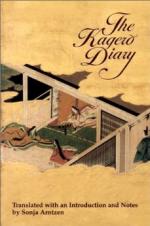|
This section contains 536 words (approx. 2 pages at 400 words per page) |

|
The Kagero Diary: A Woman's Autobiographical Text from Tenth-century... Summary & Study Guide Description
The Kagero Diary: A Woman's Autobiographical Text from Tenth-century... Summary & Study Guide includes comprehensive information and analysis to help you understand the book. This study guide contains the following sections:
This detailed literature summary also contains Quotes and a Free Quiz on The Kagero Diary: A Woman's Autobiographical Text from Tenth-century... by Edward Seidensticker.
"The Kagero Diary," is the autobiographical recordings of a Japanese woman from the tenth century. The book is translated by Sonja Arntzen from the original diary by the unknown woman. The diary represents the Heian period (794-1185) of classical Japanese literature. The author, identified only as Michitsuna's Mother (Michitsuna being the author's son), is recognized as a talented and artistic writer and poet. The woman writes about her life, with the greatest focus on her dysfunctional marriage to a man named Fujiwara Kaneie. Throughout the first two sections of the book, the misery that her disappointing marriage has caused her is the focal point of her entries and is poignantly obvious to those who read her words some one thousand years later.
The entries begin when the older Fujiwara first shows interest in the nineteen-year-old woman. She tells her father that he is not suitable for her but despite her reservations, the man is determined to win her over. During this courting period, many poems and messages are exchanged between the two. Finally, he wins her over—or at least wins her father over—and they marry. Just nine months later, she gives birth to a son, Michitsuna. Although the woman is ready to accept her life and make the most of it, Fujiwara does not take his marriage vows seriously.
Soon after they marry, Fujiwara begins taking up with his first wife, spending many hours and days at her residence. He has a child with his first wife who tries her best to win Fujiwara back. Surprisingly, the woman feels empathy for the first wife and sends her several messages, expressing her belief that Fujiwara is abusing both of them. Although Fujiwara never officially returns to the first wife, he continues the relationship for years and has another child with the woman. Fujiwara later takes up with a promiscuous woman named Omi and has a child with another woman with whom he has only a casual affair. The child, a daughter, is ironically adopted by the woman and Fujiwara later at the prompting of the woman.
Throughout the majority of the book, the woman expresses her uncertainty and pain in being married to a man who blatantly flaunts his affairs with other women and visits her only at his whim. Almost as painful as the adultery is the fretting and worry she experiences when and if he comes to visit her. The woman is a good mother and despite her obsession with her wayward husband, Michitsuna's welfare is always of paramount importance to her. She delivers a not so thinly veiled threat to her husband that if he does not take proper care of their son should she die first that she will avenge him from the grave. Her caring nature is underscored in her desire to adopt the young girl who is the illegitimate child of her roving husband.
In the final section of the book, the woman finally finds peace in her heart. Although Fujiwara never changes and becomes the husband she dreamed of as a young woman, she has come to accept him and focuses her attention on her children, her spiritual life and her community.
Read more from the Study Guide
|
This section contains 536 words (approx. 2 pages at 400 words per page) |

|



